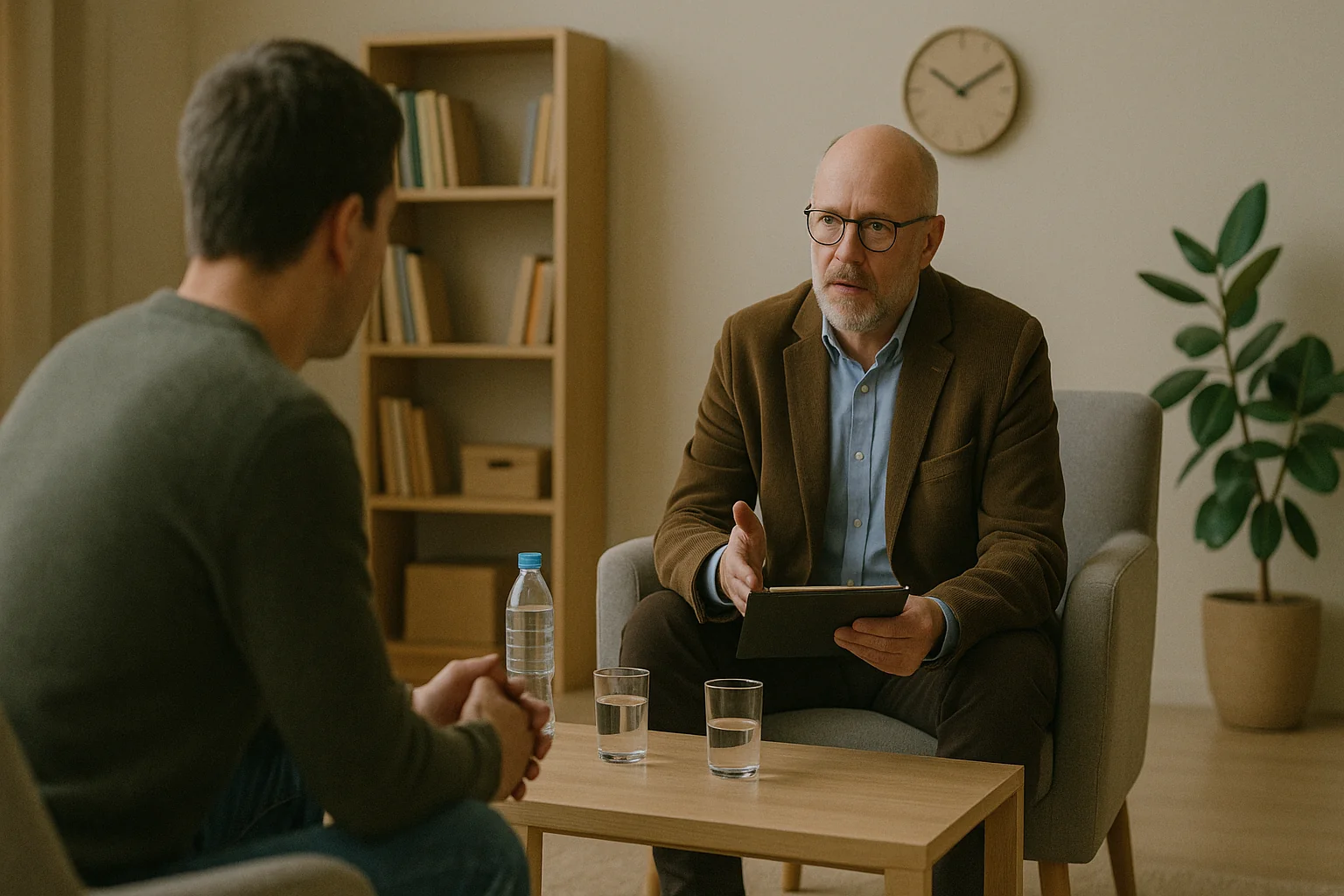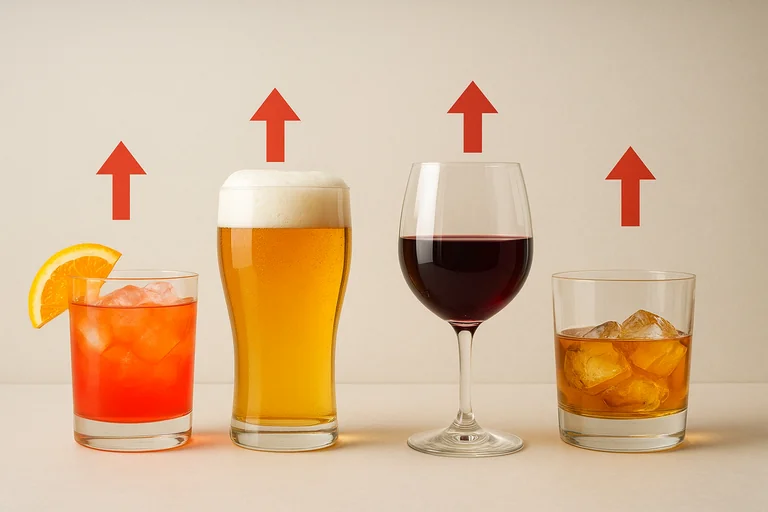A 2 minute assessment to get a personalized mental health or alcohol recovery plan.
You've tried quitting. You've promised yourself "this is the last time." But the cravings always win. Here's the truth: it's not a fair fight. Alcohol addiction rewires your brain, and willpower alone isn't enough to win. It's time for a new strategy.
What You'll Discover:
- What to do before starting the alcohol counseling process
- Steps to take to find the right type of counseling for your specific needs
- The importance of combining medication with therapy for maximum effectiveness
The idea of seeking professional help for alcohol problems may be new to some people, but it's actually been the most effective approach for decades. When traditional "willpower" methods fail repeatedly, many people assume they're personally failing. With modern therapy techniques, medication options and other evidence-based tools now available, it's actually very straightforward to get the help you need without the shame or stigma that once surrounded addiction treatment.
So, how does alcohol counseling work exactly? It's actually much more effective than most people think when you work with a qualified therapist who specializes in substance use disorders.
Do Your Research About Different Types of Counseling
Before you begin taking steps to find an alcohol counselor, it's important to learn about the different approaches available. In particular you want to look up information on:
- What type of counseling is right for your situation
- How different therapy methods work
- Potential benefits and what to expect
Therapy approaches are designed for different types of people and different stages of alcohol problems. Some methods focus on motivation, others on changing thought patterns, and still others on managing cravings. It's not just for people with severe alcohol use disorder who want to quit drinking entirely. Counseling is also appropriate for people who want better control over their drinking habits to reduce consumption.
No matter what type of counseling you're considering, it's always best to know as much as you can about the approach before starting treatment.
Why Your Brain Works Against You When You Try to Quit
The next part requires understanding what's actually happening in your brain. Don't let outdated ideas about addiction fool you into thinking this is about willpower or moral character. The reality is that alcohol literally changes your brain's structure and chemistry.
Chronic alcohol consumption hijacks your brain's reward system, making it crave the dopamine rush from drinking while simultaneously making it harder to feel pleasure from anything else. At the same time, it throws your brain's calming and stimulating neurotransmitters completely out of balance.
When you try to stop, your brain goes into a state of hyperexcitability, causing intense anxiety, irritability, and physical discomfort. This creates a powerful negative feedback loop: you feel awful, and your brain screams at you that the only way to feel better is to have a drink.
This isn't a lack of willpower. It's a neurological trap that requires professional intervention to escape effectively.
Choose the Right Type of Counseling
The next part takes research as well. You'll need to choose the right type of therapy for your specific situation. This is an extremely important decision that goes well beyond just finding any therapist.
You'll want to make sure the therapist specializes in substance use disorders and uses evidence-based approaches that have been proven effective. Experience is also extremely important. According to the National Institute on Alcohol Abuse and Alcoholism (NIAAA), several specific behavioral treatments can bring about lasting change.
Cognitive-Behavioral Therapy (CBT)
Think of CBT as a mental toolkit for dismantling the triggers that lead to drinking. The approach helps you understand how your thoughts, feelings, and behaviors are all interconnected, and how changing one can affect the others.
In CBT sessions, you'll learn to:
- Identify specific triggers that make you want to drink
- Challenge and change negative thought patterns that fuel your alcohol use
- Develop new, healthy coping mechanisms to replace drinking
CBT is one of the most well-researched therapies for understanding and managing alcohol use disorder. The approach typically involves 12-16 sessions over several months.
Motivational Enhancement Therapy (MET)
Have you ever had someone lecture you about your drinking? It probably didn't help much. That's because lasting change has to come from within, not from external pressure.
MET is different. The approach is collaborative rather than confrontational. A MET therapist acts as a guide, helping you explore your own reasons for wanting to change. They'll help you identify the gap between where you are now and where you want to be.
The goal is to help you move from "I know I should stop drinking" to "I genuinely want to stop drinking." This internal motivation is crucial for long-term success.
NEED TO KNOW: The relationship you develop with your therapist is one of the strongest predictors of success in addiction treatment. It's crucial to find someone you feel comfortable opening up to.
Contingency Management (CM)
CM uses positive reinforcement to help rebuild your brain's reward system. The approach involves receiving tangible rewards for meeting specific recovery goals - perhaps vouchers for attending sessions or maintaining sobriety for certain periods.
This might sound overly simple, but it directly addresses the neurological changes caused by alcohol addiction. CM provides your brain with alternative sources of reward, helping to weaken the learned association between alcohol and pleasure.
Research consistently shows that CM is highly effective at improving treatment retention and promoting abstinence, particularly when combined with other therapeutic approaches.
The Power of Combining Counseling With Medication
For many people, the most effective approach combines therapy with medication-assisted treatment (MAT). This isn't about replacing one approach with another - it's about using both tools together for maximum effectiveness.
Here's how it works: medication helps to quiet the biological noise of addiction, while counseling helps you address the psychological and behavioral aspects of your drinking.
Naltrexone, for example, blocks the euphoric effects of alcohol at the brain level. If you drink while taking naltrexone, you simply don't get the "buzz" or positive feelings you're used to. This breaks the cycle of positive reinforcement, dramatically reducing cravings over time.
With cravings reduced through medication, you have much more mental space and clarity to engage effectively in therapy, learn new coping skills, and address the underlying reasons you started drinking in the first place.
Take an Assessment to Determine Your Needs
Most qualified therapists will start with some type of assessment to understand your specific situation. This is a crucial part of the process for determining what type of counseling approach will be most effective for you.
The assessment typically covers your drinking history, current consumption patterns, any previous treatment attempts, and co-occurring mental health issues. This information helps the therapist tailor their approach to your unique circumstances.
Some assessments are done during your first appointment, while others can be completed online before you even schedule your initial session.
Schedule Your Initial Consultation
If counseling is deemed appropriate after assessment, you can schedule an initial consultation with a qualified therapist. The first session typically focuses on:
- Understanding your specific goals for treatment
- Discussing your medical and psychological history
- Explaining how the chosen therapy approach works
- Setting realistic expectations for the treatment process
This consultation helps both you and the therapist determine if you're a good fit for working together. Don't hesitate to ask questions about their experience, approach, and what you can expect from treatment.
Begin Your Counseling Sessions
After the initial consultation, you'll begin regular therapy sessions according to the schedule you and your therapist agree upon. Most people start with weekly sessions, though this can vary based on your specific needs and circumstances.
The work involves learning and practicing new skills, processing difficult emotions, and gradually changing the thought patterns and behaviors that contribute to your drinking. Progress takes time, so it's important to stick with the process even when it feels challenging.
Follow-Up and Ongoing Support
Having regular follow-up sessions with your therapist is crucial for maintaining the progress you make in early treatment. Many people benefit from stepping down gradually - perhaps moving from weekly to bi-weekly to monthly sessions as they build confidence in their new skills.
The follow-up process also allows for adjustments to your treatment plan if needed. Recovery isn't always linear, and having ongoing professional support helps you navigate any challenges that arise.
Group and Family Counseling: Expanding Your Support Network
Individual therapy is powerful, but it's not the only option available. Many people find that group counseling and family therapy provide unique benefits that individual sessions simply can't match.
Group Counseling Reduces Isolation and Shame
One of the most damaging aspects of alcohol problems is the isolation and shame that often develops over time. You might feel like you're the only person struggling with these issues, or that no one could possibly understand what you're going through.
Group counseling immediately breaks down this isolation. You'll meet others who are facing similar challenges, which reduces shame and helps you realize that alcohol problems affect people from all backgrounds and circumstances.
The group environment also provides powerful learning opportunities. You'll hear about strategies that have worked for others, and you'll have chances to practice new skills in a supportive setting. Sometimes hearing advice from a peer can be more impactful than hearing the same information from a therapist.
Group sessions also provide built-in accountability. When you make commitments to the group, you're much more likely to follow through than if you only made promises to yourself.
Family Counseling Addresses the Bigger Picture
Alcohol problems don't just affect the person drinking - they impact entire family systems. Relationships become strained, communication patterns become unhealthy, and family members often don't know how to help effectively.
Family counseling addresses these broader issues. Research consistently shows that involving family members in treatment significantly improves outcomes for everyone involved.
Family members learn to understand alcohol use disorder as a medical condition rather than a character flaw. They develop better communication skills, learn how to set appropriate boundaries, and understand the difference between helping and enabling.
Specialized Approaches for Complex Situations
While standard evidence-based therapies work well for many people, some situations require more specialized approaches. This is particularly true if you have co-occurring mental health conditions or trauma history.
Trauma-Informed Therapy
There's a strong connection between trauma and alcohol use disorder. Many people initially started drinking as a way to cope with traumatic experiences or ongoing trauma symptoms.
If trauma is part of your story, standard addiction counseling might not be sufficient. You need trauma-informed therapy that addresses both issues simultaneously without making either one worse.
Trauma-informed therapists understand how trauma affects both brain and body. They create safe therapeutic environments where you can process difficult experiences without being re-traumatized.
Specialized trauma therapies that can be particularly helpful include:
- Eye Movement Desensitization and Reprocessing (EMDR)
- Trauma-focused cognitive behavioral therapy
- Somatic approaches that work with the body's trauma responses
Dialectical Behavior Therapy (DBT)
Originally developed for borderline personality disorder, DBT has proven highly effective for substance use disorders as well. The approach is particularly helpful for people who struggle with intense, overwhelming emotions.
DBT teaches four core skill areas:
- Mindfulness techniques for staying present
- Distress tolerance for managing difficult emotions without acting impulsively
- Emotion regulation for understanding and managing intense feelings
- Interpersonal effectiveness for healthy communication and relationships
These skills are extremely valuable for people with alcohol problems, who often drink as a way to escape or numb overwhelming emotions.
What to Expect From Your First Counseling Session
If you've never been to therapy before, the idea might feel intimidating or uncertain. Here's what typically happens during initial sessions to help you know what to expect.
The Assessment Process
Your first appointment will usually involve a comprehensive assessment. The therapist will ask detailed questions about your drinking history, current patterns, previous treatment attempts, and any co-occurring mental health issues.
This isn't an interrogation - it's a collaborative information-gathering process designed to help the therapist understand your unique situation and needs. Be as honest as possible. Therapists have heard everything before, and accurate information is crucial for effective treatment planning.
Goal Setting
One of the first therapeutic tasks involves setting clear, realistic goals for your treatment. These might include:
- Achieving complete abstinence from alcohol
- Reducing your drinking to safer levels
- Improving damaged relationships
- Developing healthier stress management techniques
- Addressing underlying depression, anxiety, or trauma
Your goals may evolve as treatment progresses, and that's completely normal. The important thing is starting with objectives that feel meaningful and achievable to you.
Beginning the Work
Once assessment and goal-setting are complete, the actual therapeutic work begins. Depending on your chosen approach, this might involve:
- Learning to identify and challenge problematic thought patterns
- Practicing new coping strategies for managing cravings and triggers
- Processing difficult emotions or traumatic experiences
- Improving communication skills for healthier relationships
- Developing detailed relapse prevention strategies
Therapy isn't always comfortable. You might feel worse before you feel better as you confront difficult issues you've been avoiding. This temporary discomfort is often part of the healing process.
How Long Does Alcohol Counseling Take?
One of the most common questions people have about therapy is how long the process will take. The honest answer is that duration varies significantly from person to person.
Several factors influence treatment length:
- Severity of alcohol problems: More severe issues typically require longer treatment
- Co-occurring mental health conditions: Depression, anxiety, trauma, and other conditions extend treatment time
- Quality of support system: Strong family and social support often accelerates progress
- Motivation and engagement level: Active participation speeds up the process
- Previous treatment history: Prior therapy experience can sometimes help or complicate current treatment
Research suggests that most people benefit from at least 90 days of active treatment. Many people continue with some form of ongoing support - whether individual therapy, group meetings, or medication management - for much longer periods.
The important thing to understand is that recovery is an ongoing process, not a destination. Even after achieving your initial goals, continued support helps you maintain progress and continue growing.
Overcoming Common Barriers to Getting Help
Despite the clear benefits of professional counseling, many people face obstacles that prevent them from getting help. Understanding these barriers and how to overcome them is crucial.
Stigma and Shame
Perhaps the biggest barrier to treatment is the stigma that still surrounds addiction and mental health treatment. Many people worry about being judged, labeled, or seen as "weak" for needing professional help.
The reality is that alcohol use disorder is a medical condition, not a moral failing. You wouldn't hesitate to seek medical treatment for diabetes, heart disease, or any other health condition. Addiction deserves the same approach.
Cost and Insurance Coverage
The cost of therapy can seem prohibitive, but there are often more options available than people realize. Many insurance plans now cover addiction treatment thanks to mental health parity laws.
If you don't have insurance coverage or your plan doesn't cover enough sessions, consider:
- Community mental health centers that offer sliding-scale fees
- University training programs that provide low-cost therapy
- Online therapy platforms that may be more affordable
- Employee assistance programs through your workplace
- State-funded treatment programs
Time and Scheduling Constraints
Finding time for therapy can be challenging, especially with work and family obligations. However, many therapists now offer flexible scheduling options, including evening and weekend appointments.
Telehealth options have also dramatically expanded access to quality treatment. You can now receive effective therapy from home, eliminating travel time and making it easier to fit sessions into your schedule.
Remember that investing time in your recovery now can save you countless hours dealing with the consequences of continued drinking later.
Fear of Change
Even when you know your drinking is causing problems, the idea of changing can feel overwhelming. Alcohol might be your primary way of coping with stress, socializing, or managing difficult emotions.
A skilled therapist will help you work through these fears at your own pace. You don't have to change everything overnight. Small, manageable steps in the right direction still constitute real progress.
The Science Behind Why Counseling Works
Understanding the research behind alcohol counseling can help motivate you to stick with treatment, even during challenging periods.
Neuroplasticity: Your Brain Can Heal
One of the most encouraging discoveries in neuroscience is neuroplasticity - the brain's ability to reorganize and form new neural pathways throughout life. This means that the changes alcohol has made to your brain are not permanent.
Through counseling and sustained sobriety, you can literally rewire your brain. New, healthier neural pathways can be strengthened while the pathways associated with addiction gradually weaken. This process takes time - typically months to years - but genuine healing is possible.
Learning Healthier Patterns
Alcohol counseling works by helping you learn new patterns of thinking and responding to life's challenges. Instead of automatically reaching for a drink when you feel stressed, anxious, or upset, you learn to pause, assess the situation, and choose healthier responses.
This process is similar to learning any complex new skill. At first, it requires conscious effort and can feel awkward or unnatural. But with consistent practice, these new patterns gradually become more automatic and natural.
Building Self-Efficacy
Self-efficacy refers to your confidence in your ability to handle challenges and achieve your goals. People with higher self-efficacy are more likely to persist through setbacks and ultimately succeed in their recovery efforts.
Counseling builds self-efficacy by helping you:
- Develop concrete, practical skills for managing cravings and triggers
- Experience success through small, achievable steps
- Learn to view setbacks as learning opportunities rather than failures
- Recognize and build upon your existing strengths and resources
Making the Decision: Is Alcohol Counseling Right for You?
If you're still uncertain whether alcohol counseling might be beneficial for your situation, consider these important questions:
- Have you tried to reduce or quit drinking on your own, only to find yourself back to old patterns?
- Is your alcohol use causing problems in your relationships, work performance, or physical health?
- Do you find yourself thinking about drinking frequently or planning your activities around alcohol?
- Do you use alcohol to cope with stress, anxiety, depression, or other difficult emotions?
- Have people close to you expressed genuine concern about your drinking habits?
If you answered yes to any of these questions, professional counseling could be extremely beneficial for you.
Don't wait until you've "hit rock bottom" to seek help. In fact, earlier intervention typically leads to better outcomes and shorter treatment times. You also don't need to be ready to quit drinking completely to benefit from counseling. Many therapists work effectively with people whose goal is reducing consumption rather than complete abstinence.
The most important step is the first one. Recovery is a journey that begins with a single decision to get help. Whether that means calling a therapist, attending a support group meeting, or taking an online assessment, what matters most is moving in a positive direction.
Your life doesn't have to be controlled by alcohol. With the right professional support and evidence-based tools, you can regain control and build the life you genuinely want. The question isn't whether you deserve help - you absolutely do. The question is whether you're ready to take that first step.
Ready to explore your options? Take our Alcohol Use Assessment to get started.




